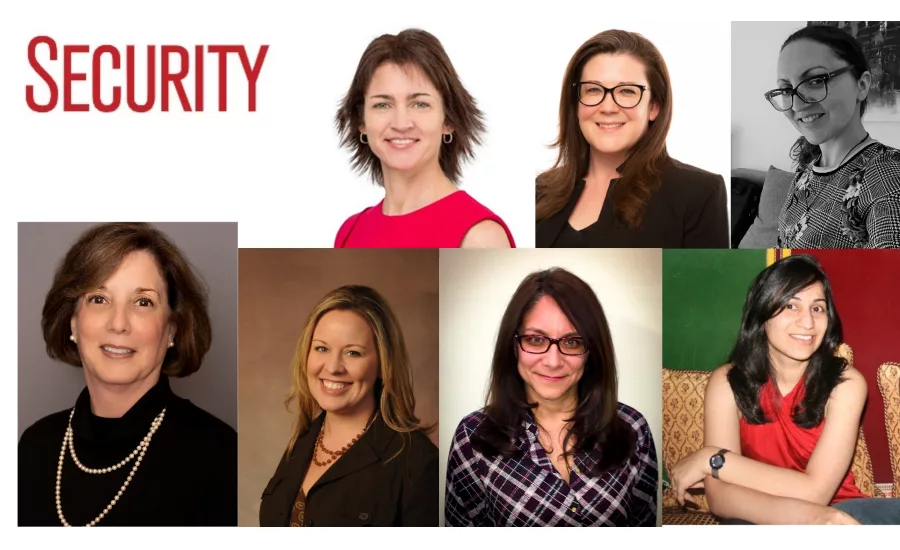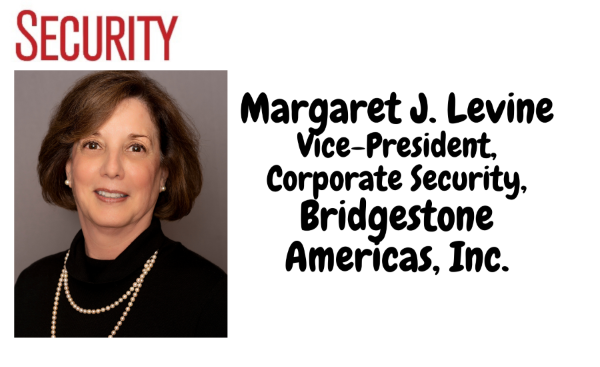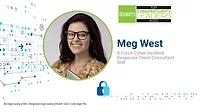Celebrate these Security Leaders for International Women's Day!

We asked several Women Security Leaders to tell us what drew them into the profession, along with their thoughts on continued diversification of the industry. Let's celebrate these leaders on International Women's Day and give a shout out to your Women Security Leaders by emailing us or recognizing them in the comments section of our social media posts today!

Security magazine: What drew you into the security profession?
Meredith Plaxco, Vice President, Loss Prevention and Safety, PetSmart: Being part of a Safety, Security and LP function is the best kind of “why,” that involves protecting people (and in our case pets), profit and pursuing the truth. As a leader it’s something you can build a meaningful career and organizational culture around particularly in the private sector. No matter what role I’ve had in supporting the team, it has always felt like work worth doing, because your team is making a difference both immediately and long term.
Security magazine: What can the industry do to increase diversity and inclusion for security leadership roles?
Plaxco: It’s starts with hiring/promoting to amass diversity of thought in your organization’s perspectives, especially in security/asset protection roles. When you have the chance to choose between two candidates of similar attitude, competencies and experience, pick the diverse candidate, the one that is a true “culture add.” Eliminate “culture fit” from your vocabulary, because with a culture fit there is limited perspective, and diverse perspectives will win every time.
If diversity is being given a seat at the table, then inclusion is being asked for your perspective. Make sure you are demonstrating inclusion in your organization starting with meetings, by actually asking individuals for their perspectives, not just inviting them to the table. If someone isn’t sharing, you have an obligation as a decision maker to ask them for their thoughts to make sure they truly feel included and that you get the full value of diversity of thought for your company.

Security magazine: What drew you into the security profession?
Margaret J. Levine, Vice-President, Corporate Security, Bridgestone Americas, Inc.: I wanted a career where I could have an impact on both people and business, solve problems and help people and businesses avoid them, and one that was challenging and provided plenty of opportunities to learn. I didn't want to just do the same thing day-after-day. I had worked professionally for 15 years before my first job in security. While I loved what I was doing before, it was my first job in security –at Mobil Oil – that changed everything. It was clear to me almost immediately that the field of security was to be my career. It not only met all the criteria I was looking for in the ideal profession, but it also afforded me the opportunity to travel the world and experience the diversity of both people and culture. Plus, it’s a profession where I have found inherent camaraderie, great people, and a real sense of community.
Security magazine: What can the industry do to increase diversity and inclusion for security leadership roles?
Levine: I believe it is human nature to, at least on some level, want to hire and work with people who are basically like us – maybe look like us, even act and react like us. We’ve got to get out of our comfort zone, take risks and be open to the possibility that someone who doesn’t “fit our mold” may likely be the best choice for our team. I also believe there are some very practical steps that can be taken to impact diversity and inclusion in the security industry. For example, take steps to ensure a broad cross-section of security leaders have greater visibility in the industry, allowing others to experience differences in approach and technique, hear differences in viewpoint and thought, and gain understanding that different perspectives add value to our profession not detract from it. In other words, diversity should become a cultural norm in our profession and workplace, and not just a buzzword. And lastly, it’s critical to get beyond thinking of diversity simply as gender, race, sexual orientation, etc., and start embracing diversity of background, thought, and outlook throughout our industry.

Security magazine: What drew you into the security profession?
Rene McIver, Chief Security Officer (CSO), SecureKey Technologies: In high school, my favorite subjects were math and physics, but I was convinced that I wanted to become a child psychologist when I graduated. I attended Mount Saint Vincent University, a primarily women’s university in Halifax, majoring in psychology. About a year and a half in, I realized my heart wasn’t in it. I signed up for an elective calculus course at Dalhousie University – and I loved it. That, together with becoming incredibly inspired by an article I had read about a female cryptographer, and my mind was made up – I switched my major from psychology to math and graduated with a double minor in psychology and physics. Easily one of the best decisions I have made. It set me on this path of information security and privacy and I’ve never looked back.
Security magazine: What can the industry do to increase diversity and inclusion for security leadership roles?
McIver: While Canada has made significant growth toward achieving greater gender equality, gender bias still exists - even more so in the technology and cybersecurity fields. Increasing diversity and inclusion for these roles must start with representation. Seeing other women in leadership roles can inspire others to pursue that track. At SecureKey, we are devoted to recruitment efforts that support young women and stay informed on speaking engagement prospects to help encourage other women. We are also incredibly proud to work with FINCA Canada, helping provide small loans to women in poverty across different continents. With this, women get the funds they need to start a business of their own and feel empowered through doing so.

Security magazine: What drew you into the security profession?
Melissa Allgood, Director of Loss Prevention, Universal Studios Hollywood: Long story, suffice it say I noticed guys coming in and out of doors while working in a department store and inquired what they were up to. I was introduced to the world of Asset Protection. I became fascinated with people watching. I observed so much theft activity while working and called it in that I was recruited to join the team. They were tired of me calling… I started as a shoplift agent and fell in love with the business. I've been in the industry ever since. I learned so much and gained so much experience from various companies, that I was well-positioned to take the role as Director Loss Prevention for Universal Studios Hollywood. I am grateful for the chance to work for NBC/Universal, a Comcast Company. While not something I planned as a career, I have had the best time doing this for a living, I love what I do.
Security magazine: What can the industry do to increase diversity and inclusion for security leadership roles?
Allgood: Continue to stretch beyond what is considered “the path” to work in the Security Industry, i.e. leaning toward candidates with a Law Enforcement background. There are many excellent candidates perfect for security and loss prevention roles within an organization that haven't had a previous career with public or government agencies. While government and public agencies have become more diverse over the last several years, the private sector continues to outpace them. Developing a strategy to recruit those with transferable skills from private industry would provide more opportunity to increase diversity and inclusion.

Security magazine: What drew you into the security profession?
Heather Hearn, Senior Security Advisor, Wawa, Inc.: While studying for my undergraduate degree in criminal justice, I applied for a part-time job with the Wawa Central Station. I wasn’t sure exactly what role a Central Station played or the range of duties it encompassed, but it provided what I was looking for at the time – a job with flexibility and hours available in between my course load. From my first day, I was absolutely fascinated by the breadth, scope and impact of the operation, and I’ve never looked back. With each day, I was more drawn to a career in private security, thoroughly enjoying what I was doing while learning how security systems operate, understanding and evaluating security needs of a convenience store and, most importantly, how I could play an integral role in supporting the safety of our associates, customers and community. While I remained passionate about my criminal justice studies and continuing my education, I knew that I found exactly where I belonged. I made the decision to pivot my aspirations for law enforcement career to build a career in the private security sector, which remains my passion today. I am now entering my 25th year with Wawa, and remain just as excited as that first day to learn something new!
Security magazine: What can the industry do to increase diversity and inclusion for security leadership roles?
Hearn: Over the years, women have made strides in closing the gender gap in this traditionally male-dominated industry, but there are still opportunities. If the talent at the top does not reflect the population, those involved in our profession will believe that they do not belong or see a place for themselves for advancement and will take their talent elsewhere. And while progress is being made, organizations need to go beyond just fostering the diversity, equity and inclusion conversations and take active steps to coach and develop the diverse population that exists within its own walls. Increasing opportunities for networking, speaking engagements and exposure to roles, projects and opportunities is a great next step to advancement in the security industry. I know I had the benefit of this and it has, and continues to greatly shape my own career doing what I love with a company I love.

Security magazine: What drew you into the security profession?
Prutha Parikh, Sr. Manager, Security Research, SpiderLabs at Trustwave: I first realized I had a passion for security while I was in college. The math behind cryptography fascinated me, and I ended up graduating with a specialization in computer security. I was hired as a security analyst by a Big 4 consulting firm for an entire semester before I graduated, and I really enjoyed helping clients make their networks and infrastructure secure in my very first role in this profession. After exploring compliance and security governance early on in my career, I ventured into the cybersecurity research space for a more fast-paced and challenging environment. I think the constantly evolving nature of threats has kept me attracted to this profession after these many years, wanting to learn more.
Security magazine: What can the industry do to increase diversity and inclusion for security leadership roles?
Parikh: Creating leadership development programs curated for women can help with mentoring candidates who have demonstrated competence or are willing to take on more responsibilities. Sponsoring growth and learning opportunities that are easily accessible is vital. Executive leadership across the industry should consciously advocate for inclusiveness, be a champion for women and provide a platform that allows them to voice their opinions.

Security magazine: What drew you into the security profession?
Ralitsa Miteva, Fraud Detection and Prevention Solutions Manager at OneSpan: While I was working on obtaining my master’s degree in economics and management of information communication technologies, the focal point of my studies was mainly telecommunications. It made sense to organically transition to the professional sector where I could specifically dedicate attention to the security of these technologies. That was my first encounter with fraud analysis. I have an analytical mind, and I’m fascinated by patterns and finding connections and data insights. As such, it felt like I found a place where I could utilize my skill set.
I started my anti-fraud career 13 years ago by working in the fraud department of a mobile operator. I then discovered digital payment technologies and realized fraud is much more diverse when payments are involved. I have worked in various organizations to fight fraud, and I realized many problems are not always in the analysts’ control. That’s why later on, I moved to the vendor space, where I was able to help innovate the technologies that are used in the fraud departments and assist organizations in finding solutions to their security problems.
Security magazine: What can the industry do to increase diversity and inclusion for security leadership roles?
Miteva: Professional opportunities for women often stretch to middle management in roles such as department manager, but they rarely go as far as the C-level. If organizations have enough strong female leaders, the overall attitude in the workplace will be much more accepting and “female-friendly.” It’s important to note that organizations should hire and promote women because they deserve it, not just to improve the statistics. That’s the only way to prove that experts and leaders can be female too.
Women’s voices need to be heard, and their contributions that have resulted in the company’s success should be more visible. Successful organizations are set up to support every worker to excel. However, this has to come from the top down, as C-suite backing is a key to the success of these initiatives for every organization.
Looking for a reprint of this article?
From high-res PDFs to custom plaques, order your copy today!









